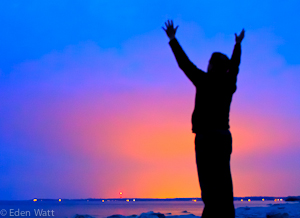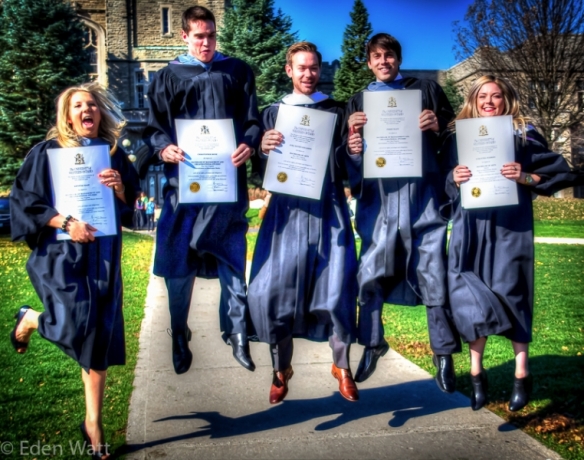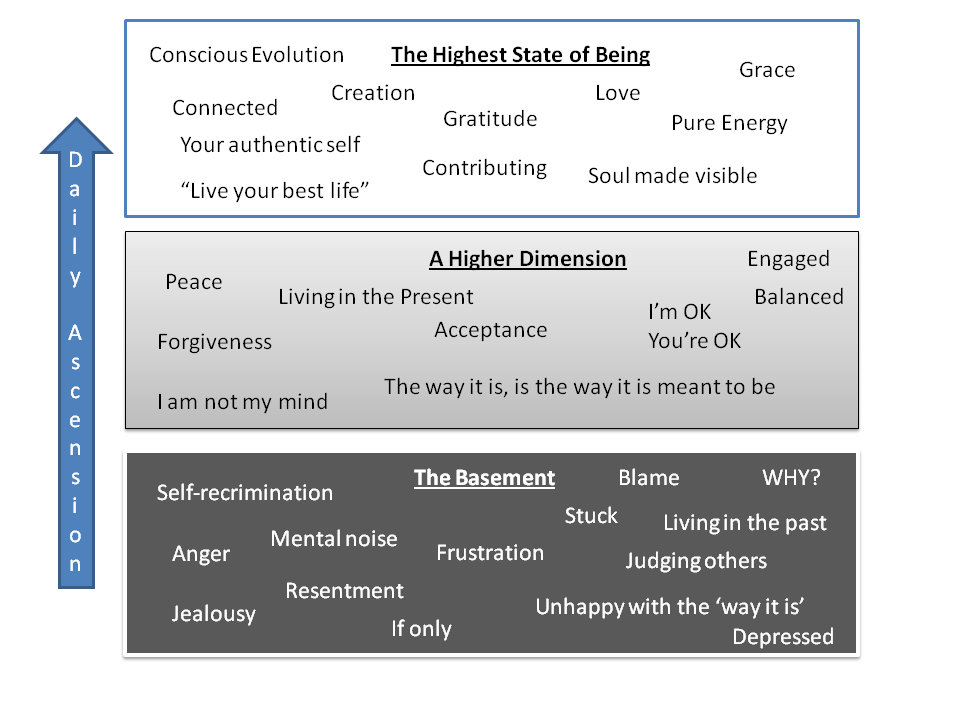Early morning and long day, today, but my son Perry (2nd from right) graduated from Western University today with his Bachelor of Management and Organizational Studies (Specialization in Finance and Administration). We’re back home but he is still in London celebrating. It’s been a long 4 years but I am very proud of him. After a shaky start in first year, he had to work extra hard and take some summer courses to get his degree but in the end, he did very well and has grown up since he first started back in 2008. He already has a job with Ricoh Canada as an Account Manager.
OpenBook
Staying out of the Basement
Are you conscious of your busy mind? Do you occasionally find yourself angry or depressed, just by the random thought generation at work in your head, even when nothing has happened in the present to trigger this response?
In my post “The Top Ten Tips for Living a Happy Life”, one of the key concepts was “Your thoughts create your reality”. This topic including others related to this critical idea that we are not our mind/ego. We have the ability to create our own reality. You will find variations of this theme common among many of the thought leaders, spiritual and self-help teachers today.
In my own life, I regularly revisit these concepts, especially when I find my mind sabotaging all the work I’ve done to stay positive and loving and present. In the following chart, I’ve summarized three ‘states of being’ with examples of what kinds of thoughts and feelings characterize each state. Where do you spend most of your time? If the answer is the ‘basement’ then I encourage you to do the work you need to do to come upstairs!
If you are often frustrated, feeling resentment, blaming others for your situation, asking questions like “Why me?” and “What if?”, dwelling on the past and obsessing over thoughts like “If only I’d done this”, and are generally unhappy with the “way it is”, then I would call that living in the basement. Other symptoms might be that you are overly judgmental of others, depressed, and feeling stuck.
Ascending to higher levels will not only result in your feeling more joy in your life but you will be more able to contribute to others and enjoy meaningful relationships. This involves living in the present, accepting that the universe is unfolding as it should and being grateful for your life.
I’ve put together this chart to remind myself of this. This can also serve as a quick check to see where you’re at and ‘get off it’ if you catch yourself lingering in the ‘basement’.
Is Socialization Essential to our Survival?
I’ve always been fascinated by that time in our distant past when we shared this planet with another sentient species – the Neanderthals. No doubt my initial interest was fueled by Jean M Auel’s incredible books, starting with the “The Clan of the Cave Bears”.
When I was working on my novel, “Vision Speak”, I spent some time researching the evolution of man and the crossroads that our collective species faced at this time 40,000 years ago and what drove us to become an advanced species with mastery over the planet. Early steps toward this seemed to be formed during that crucial period of time in Europe leading into the last ice age. Jared Diamond’s book “Guns, Germs, and Steel” had some interesting information about the evolution of humans, in particular analyzing why some areas of the world progressed at a rapid technological pace while others remained relatively primitive.
Recently, I came across a fascinating BBC series, called “The Human Journey” on this very topic, which I highly recommend. This is available on youtube with the particular episode about humans and Neandertals in Europe at http://www.youtube.com/watch?v=nfIv76FrHDU
Homo neanderthalensis, or the Neanderthals, are a distant cousin on the evolution chain to our species, Homo Sapiens. There is evidence that they arrived in Europe around 800,000 years ago. The earliest Homo Sapiens appeared on the scene in Africa around 160,000 to 200,000 years ago.
The 40,000 year old mystery that anthropologists have been investigating involves the survival of the human race during this time in our history when we co-habited Europe with the other sentient species. When our homo sapien ancestors immigrated to Europe out of Africa, the Neanderthals were already well established there. There is no evidence of warfare between our two species and yet the Neanderthals, who rivaled humans in the areas of brain power and physical strength, eventually became extinct while humanity evolved and prospered. Why? Experts have speculated that a key factor was our wider social networks, as evidenced by spiritual practices and gatherings, icons and artwork, as opposed to the more isolated grouping of Neanderthal populations.
So, our species’ ability to share ideas and connect beyond our immediate social group may have been what allowed us to evolve and thrive even in the face of scarce resources during an ice age.
Yet many have questioned the viability of our species in the centuries to come. Certainly, we’ve all feared where we may be going when we consider the effects of war and oppression, after viewing evidence of human carnage, cruelty, and torture, when we come to understand our growing populations and the effect of our progress on our planet’s diminishing resources.
Perhaps our growing world community enabled by social networking can provide a key to our survival from these dangers.
Ideas of “Conscious Evolution”
What is “Conscious Evolution” and how can this affect how you live your life? Barbara Marx Hubbard, one of the founders of this movement, has defined it as follows: “Conscious evolution is the evolution of evolution, from unconscious to conscious choice. While consciousness has been evolving for billions of years, conscious evolution is new. It is part of the trajectory of human evolution, the canvas of choice before us now as we recognize that we have come to possess the powers that we used to attribute to the gods.” For the full explanation, visit her Foundation for Conscious Evolution site. Although, underlying these theories are the potential for dire consequences for mankind, all of these thought leaders are directing us to work together towards a more glorious future. I was particularly inspired by her statement: “…We can and are actually moving beyond the creature human condition toward a new species, a universal humanity, capable of coevolving with nature.”
For many people, the term “evolution” evokes thoughts of Charles Darwin and his famous work: “On the Origin of Species” which explains how all species on Earth have physically evolved from the very beginnings of life through natural selection and random mutations. This theory, although initially rejected by many scientists and most certainly by the church in the mid 1800’s, has become a foundational work in the fields of natural history and biology and serves as a widely-accepted explanation for the origins of man.
However, the process of Natural Selection and, in particular, the concepts around “Survival of the Fittest” whereby those with the most favourable genetic traits will win the reproduction war is now under some debate by scientists and modern day philosophers, especially as it applies to the current state of sentient man.
Consider this quotation from Andrew Cohen, another thought leader who is expanding our understanding of Conscious Evolution through his writing and teaching and his organization Enlightennext:
“… I believe we have reached a time in history when God, which I would describe as the energy and intelligence that initiated the creative process, is now completely dependent upon us—upon sentient life forms that have evolved to the point where they are blessed with the extraordinary gifts of complex cognition, self-awareness, and freedom of choice. At this critical juncture, our own future and the future of our planet will be determined by the conscious choices that we human beings make, rather than by the whim of a higher power or according to some predestined plan.” To read the full article, go to Cohen’s site.
In that same article, Andrew Cohen goes on to explain the ultimate purpose in humanity’s spiritual development: “…to liberate the miraculous power of human choice from being unconsciously trapped in a cultural epidemic of narcissism, materialism, and existential apathy. Our moral, spiritual, and cultural evolution—if not our very survival—really do depend on it.”
Dr. Bruce Lipton is another pioneer in this field of Conscious Evolution. With a PhD in cell biology, he is a renowned author and speaker on the topic of “Uncovering the Biology of Belief”. I’ve seen him speak at a Hayhouse event and he is both informative and inspirational. This excerpt from his site bio referencing his breakthrough work in the field of epigenetics, proving that factors other than genes can affect cell behaviour shows how he has stepped outside of cell biology to extrapolate his knowledge to the evolution of human consciousness – “…Dr. Lipton’s novel scientific approach transformed his personal life as well. His deepened understanding of cell biology highlighted the mechanisms by which the mind controls bodily functions, and implied the existence of an immortal spirit.”
I’m again reminded of a work of fiction that ignited the imagination of many on this topic in the 90’s called “The Celestine Prophecy”. The author, James Redfield, used this spiritual adventure to share his views on the evolution of consciousness through the Nine Insights that the characters discover in the story.
 I don’t think it’s relevant to debate the specific insights or progressions as Redfield saw them in order to gain some insight into these ideas. Redfield’s Celestine books raised awareness for mysterious coincidences, human prayer-energy, channelling thoughts into a collective, dynamic force, and evolving towards a spiritual culture on Earth.
I don’t think it’s relevant to debate the specific insights or progressions as Redfield saw them in order to gain some insight into these ideas. Redfield’s Celestine books raised awareness for mysterious coincidences, human prayer-energy, channelling thoughts into a collective, dynamic force, and evolving towards a spiritual culture on Earth.
Conscious Evolution is a broad topic which touches on many spiritual and religious beliefs which I will continue to explore in future posts. One of the underlying messages that I find valuable with all of this work is that we are powerful, connected, spiritual beings with the ability to transform ourselves and our world.
Sometimes when I question why I write this material, manage this blog, share images and video that I believe to be beautiful, I remind myself that a continued focus on sending out positive, loving thoughts into the world through art, writing, or whatever avenues are available or suitable to each of us, is part of contributing to our collective consciousness, and driving us forward in our personal and shared evolution.
This follows on the teachings of two well-respected thought leaders today – Deepak Chopra and Eckhart Tolle. In my review of Tolle’s “Finding your Life’s Purpose” (blog post), one of the questions asked was: How can our species survive unless there’s a change in our collective spirit, our consciousness? The conclusion is that the only way that we can affect such as a transformation is by working on our own individual consciousness.
To emphasize this point, I will leave you with Deepak Chopra’s words: “… the only way to transform the world is to transform yourself..”
Ten Tips for Living a “Happy” Life
What is “happy” and is it really attainable? In this age of fast-paced, information overload, what do we really want from life?
I believe we want what people have always wanted. We want to be happy. We want to love and contribute to others. We want to be loved. We want to think we’re making a difference, that there’s a “reason” or purpose for our existence.
While some might argue that happy is an overused term and not a practical goal, let’s consider happy as being peaceful and content, as being the opposite of miserable, as being empowered to be all that we can be in life, to be able to have loving and sustainable relationships. And then, I think, everyone will agree that this is a state where we would all like to be centered. 
Based on my own personal exploration into this essential quest, I’ve summarized what I view as the Top Ten tips to a Happy Life, as taught by many of the thought leaders today who are great authors, speakers, and spiritual teachers..
TOP TEN:
1. Be Present, Be Here Now
Studies suggest we have somewhere between 12,000 to 65,000 thoughts per day, although I’ve seen reference to a wider range (between 2,000 to 600,000!). Most commonly, 50-60,000 is considered a good estimate.
Being human means being inundated with thoughts all day, every day: endless observations, judgements, interpretations, complaints, worries, ‘what-ifs’, memories, regrets, wishes, desires, dreams about our future, anger about our past, and on and on. I’ve seen statistics indicating 95% of them are similar from day to day. Some thoughts seem completely random, others can hijack us as we follow a thread and let our emotions react to what are sometimes completely irrational, twisted versions of reality. For me, it has been a major breakthrough to understand that I am NOT my thoughts. For too long, my thoughts ran me. They still try to, every single day, but I am watching them now. I used to look to my thoughts for meaning, wondering why I was suddenly upset when nothing had happened.
So how much of an average person’s thoughts are rooted in the present moment? Some suggest that the majority of our thoughts are rooted in the past (somewhere between 70 and 90%) with about 10-20% ruminating or dreaming or imagining what will happen in the future. A small percentage of our thoughts actually focus on the present moment in a purely experiential manner. Within our minds, our perception of the past, how it is affecting us now and into the future can often become warped.
Eckhart Tolle, author of “The Power of Now” and “A New Earth” and other books is a well-known speaker and teacher in this area. Tolle tells us: “Stay fully present in the now-your whole life unfolds here. In the now there is joy of Being and deep peace”.
In Deepak Chopra’s “Seven Spiritual Laws of Success”, he says that pure potentiality is pure consciousness, the field of all possibilities and infinite creativity. Meditation to connect with our inner being to be present and master our thoughts can help us to find that state of pure consciousness.
2. Your Thoughts Create your Reality
When you start to understand that you are not your thoughts, that you are a being with a powerful inner spirit that happens to also have a brain that does what brains do, non-stop generation of thoughts, you can step back and observe this and take control. Consider how you can choose how your brain operates just as you make these decisions about using your arm or your fingers or your eyes every day of your life.
The realization that you actually could control and direct your thoughts to create whatever reality you choose can open up a whole new world. If, for example, you tell yourself that you cannot succeed at something – then you probably won’t. So, the obvious question is why tell yourself that? And yet we do it all the time..
There’s so much groundbreaking work in this area over the past decade, everything from the books on the Law of Attraction (including the blockbuster work called “The Secret”) and new science indicating that thoughts are actually bits of quantum energy (see my post entitled “The Science behind the Mystery”), which opens up even more unbelievable implications for our potential capabilities if we can master our mind.
Louise Hay (founder of Hay House) is an inspiring example of this powerful concept in action. Her countless books and CD’s on Affirmations show how you can change your life by the very simple practice of constantly generating positive, life-affirming thoughts. From “Power Thoughts” by Louise Hay: “Trust life to hear and respond to your positive words. Say these affirmations every day and your whole world will change for the better.”
3. Be Grateful
Expressing gratitude, especially if you can make it a daily practice to declare everything you are grateful for in your life, can create positive self-affirming thoughts instead of negative ones and align your attention to everything that is good in your life. This alone can be transformational. Many current thought leaders and spiritual teachers encourage people to keep a gratitude journal.
If you do a search on Gratitude quotations, you will find many empowering thoughts. Here’s a few:
“I would maintain that thanks are the highest form of thought; and that gratitude is happiness doubled by wonder.” G.K. Chesterton
“God gave you a gift of 86,400 seconds today. Have you used one to say ‘thank you?’ ” William A. Ward
“If the only prayer you said in your whole life was, ‘thank you’, that would suffice.” Meister Eckhart
4. Trust that the universe is unfolding as it should..
 Or perhaps an easier way to say this is, Have Faith. Sometimes in our darkest hours, when nothing seems to be going as we had wanted or expected, we can’t see this. We want only to fight against what is. Everything will not always go our way but, if you trust life and let it unfold, as Mick Jagger said, “you just might get what you need”.
Or perhaps an easier way to say this is, Have Faith. Sometimes in our darkest hours, when nothing seems to be going as we had wanted or expected, we can’t see this. We want only to fight against what is. Everything will not always go our way but, if you trust life and let it unfold, as Mick Jagger said, “you just might get what you need”.
For some this could mean a belief in God, aligned with one of the great faith traditions, for others it might just mean knowing that there is a greater life force, that we are all a part of it, and that life will take us where we need to go if we surrender to it.
5. Practice Forgiveness
Oprah and others, have defined Forgiveness as recognizing that you can’t change the past. We hold onto a lot of resentment and in the end, who does it hurt? We hurt ourselves more than anyone else. Accepting what has happened and creating the space to move on can be a powerful step forward.
Sometimes, particularly if you have been a victim of crime or abuse, whatever happened may seem ‘unforgiveable’. In these cases, remember that forgiveness does not mean you have to let that person back into your life but it can release you from the hold that this has on you.
In other cases, we may have imagined transgressions that were in reality, minor. Caroline Myss, medical intuitive and author of a number of bestselling books including “Sacred Contracts”, outlines the common archetypes that drive our behaviours. She identifies the “Victim” as one of the four archetypes for survival which can lead you to believe that “you are always taken advantage of and it’s never your fault.” If this feels familiar, her work may be of interest.
Regardless of the situation (and many may lie in between these two extremes), if you have anger or bitterness in your heart, you must do the work needed (whatever that is for you) to let it go. It literally will suck the life out of you and can affect all your relationships. The serenity prayer from AA says it all: “God, grant me the serenity to accept the things I cannot change, Courage to change the things I can, And wisdom to know the difference.”
6. Follow your Bliss
One of Joseph Campbell’s famous quotations…
Many will say that they would love to follow their bliss but they have to pay the bills, don’t have time, it’s too late to change course, or any other number of excuses.
I would contend that for many of us, we don’t really know what our ‘bliss’ is. Of course, it seems like it must be the greener grass on the other side. Certainly, the idea of walking away from a tough job and living in luxury seems blissful – but this is not what Campbell intended.
Sometimes we need to take a hard look at our life circumstances and make adjustments along our journey. The important thing is to be conscious. Make conscious choices. Embrace work that you love. Remember, even when you’re “following your bliss”, there will be tough sledding at times. This is certainly not a free ticket to quit.
7. Choose your Life
This is another perspective on “Follow your Bliss”. Sometimes, it’s not our outside circumstances that need to change but our interior dimension.
I took a course called the Landmark Forum many years ago, and this was a key concept after three long days of workshop. It correlates back to the idea that ‘your thoughts create your reality’.
When you declare that your life, your spouse, your children, your job, your world are all exactly what you always wanted, then they will become that for you.
8. Don’t take yourself too seriously
Or, put another way: “Get over yourself”.
No one likes criticism and we all have fragile egos… but sometimes, when our thoughts hijack us, we can turn the simplest comments into conspiracy theories.
The truth is that not everything is about you, sometimes when people scowl at you, it’s because they’re unhappy inside. If a person says something to you that you don’t like, you don’t have to react in kind. In fact you may be able trigger transformation in another by not letting your ego take over, instead be present with that person and be compassionate.
Deepak Chopra asserts that “… the ego is not who we really are. The ego is our social mask, it is the role we are playing.”
If you are aware and present with people, not coloured by past injustices or imagined indignities, then you can choose to always have powerful, meaningful conversations.
Not being driven by ego takes focus, commitment, and courage…
9. We are all one
When you take steps to be present, become committed to not ‘be your ego’ or run by your thoughts, to be grateful for the people in your life, and to create your reality then you will start to sense more and more that you are not alone but a part of something much greater, the collective spirit of humanity.
Even the latest scientific breakthroughs with respect to quantum consciousness and unified field theory are demonstrating that the universe and everything in it, ourselves included, are interconnected by a vast field of energy.
In this collective space, love and contribution become natural which in turn can fuel harmony and peace in your life.
10. Conscious Evolution
Last year, I took the Evolutionary Worldview Course through Enlightennext Magazine and Andrew Cohen and later, watched the event: “A Call to Conscious Evolution, Our Moment of Choice” which was also hosted by this group. Both experiences were inspirational and eye-opening. As Deepak, one of the many renowned speakers at the Evolutionary Leaders’ event, said: “… the only way to transform the world is to transform yourself..” and “… even well-meaning activism is often coming from a place of outrage rather that creative consciousness..”
This jives with many of the teachings of Andrew Cohen and his team with respect to the evolution of our interior dimension and our culture. Our mind, our being, or our “interior dimension” as they call it have evolved just as our bodies have. They talk about 4 billion years of evolution on this planet and how we, as sentient, powerful beings, can now choose where we go from here. They ask questions like: “how does your own evolution come into the culture, into changing the world?” and “To what degree are you enabling this process of evolution through your own heroic efforts?” so that we can leave the world a better place because we were here.
Making conscious decisions everyday to feed and exercise your body for optimal health and well-being is the other side of the coin to choosing the thoughts that you feed yourself for optimal mental health and well-being.
The So-called “God” Particle
If a journalist had never nicknamed this discovery the “God” Particle and we had simply heard the news that the “Higgs boson” particle had been found, would it have made as many headlines? Would it have become a trending topic on Twitter and the focus of so many in the blogosphere (this one included)?
News reports have called this one of the most important scientific discoveries of this century which seems mind-blowing to laymen such as myself. After all, how can something so small that we haven’t even been able to perceive it with our most powerful equipment change our very perception of the universe?
This subatomic particle has long been postulated as a missing ingredient to prove the existence of the Higgs boson field which converts energy into mass, connecting elementary particles and ultimately explains how the “Big Bang” produced planets and stars instead of a universal caldron of light-speed moving particles.
The Higgs boson field, also referred to as the zero point field is an invisible energy field filling the vacuum of space which is theorized to have given mass to elementary particles such as electrons and quarks, acting as the glue to form atoms, the building blocks of mass in the universe. This “god” particle was theorized in the 60’s by a group of scientists, lead by Higgs, as part of the Standard Model for the physics of the universe. Finding proof of its existence takes them closer to understanding this complex model but this does not give them all the answers.
In the past decade, many thought leaders have postulated how the properties of quantum mechanics inter-relate with theories on quantum consciousness and the spiritual implications of entanglement and nonlocality and the Heisenberg uncertainty principle. For those who have been following these ideas, you might wonder how this discovery affects this.
Generally speaking, I would say that it changes nothing. After all, these properties still apply to the divine universe that was formed, partly as a result of our new particle ‘glue’, and further understanding this is a wondrous move forward. It’s a unique quality of the human spirit, to seek this knowledge, to try and understand where we come from and where we are going…
The “Desiderata”
This famous piece of prose insinuated itself into my psyche at an early age. At our cottage in Huntsville, my parents hung the “Desiderata” on the wall of the main floor washroom. So everytime I sat on the toilet as an impressionable young girl on our weekends away, I would read it and try to make sense of what it told me. I believe my parents had become enamoured with the “Desiderata” when Pierre Elliott Trudeau shared it with Canada in one of his speeches. It was apparently a ‘motto’ for how our former, illustrious Prime Minister carried himself in the world… and my parents were fans of Trudeau.
I forgot all about this until a couple of years ago when my son, Jordan, gave us a large poster/plague for Christmas with a picture of a waterfall and the words of the “Desiderata”. This is now hanging in the bedroom.
It was always a mystery to me that these eloquent words of wisdom on how to move through life with grace was not credited to anyone. The poster in our bathroom in the 70’s credited the writing to “anonymous” and the one in my bedroom does not reference an author at all. In writing this post, I did a quick google search and discovered that it was in fact written in 1927 by American writer Max Ehrmann (1872–1945). There was some confusion over this and due to a series of blunders, it was assumed to be written in 1692 by an unknown author and therefore copyright-free. It wasn’t until a spoken word song was released of the “Desiderata” in the early 70’s that the family of the author was able to declare the rightful author and win royalties.
“Desiderata” is a Latin word meaning “Desired Things”. A few choice phrases (“the universe is unfolding as it should”, “be gentle with yourself”, “keep peace with your soul”) have always resonated with me and seem ahead of their time for when this piece was written.
Here is the full prose poem:
Desiderata by Max Ehrmann
Go placidly amidst the noise and haste, and remember what peace there may be in silence. As far as possible without surrender be on good terms with all persons. Speak your truth quietly and clearly; and listen to others, even the dull and the ignorant; they too have their story.
Avoid loud and aggressive persons, they are vexatious to the spirit. If you compare yourself with others, you may become vain or bitter; for always there will be greater and lesser persons than yourself.
Enjoy your achievements as well as your plans. Keep interested in your own career, however humble; it is a real possession in the changing fortunes of time.
Exercise caution in your business affairs; for the world is full of trickery. But let this not blind you to what virtue there is; many persons strive for high ideals; and everywhere life is full of heroism.
Be yourself. Especially, do not feign affection. Neither be cynical about love; for in the face of all aridity and disenchantment it is as perennial as the grass.
Take kindly the counsel of the years, gracefully surrendering the things of youth. Nurture strength of spirit to shield you in sudden misfortune. But do not distress yourself with dark imaginings. Many fears are born of fatigue and loneliness.
Beyond a wholesome discipline, be gentle with yourself. You are a child of the universe, no less than the trees and the stars; you have a right to be here.
And whether or not it is clear to you, no doubt the universe is unfolding as it should. Therefore be at peace with God, whatever you conceive Him to be, and whatever your labours and aspirations, in the noisy confusion of life keep peace with your soul. With all its shams, drudgery, and broken dreams, it is still a beautiful world. Be cheerful.
Strive to be happy


